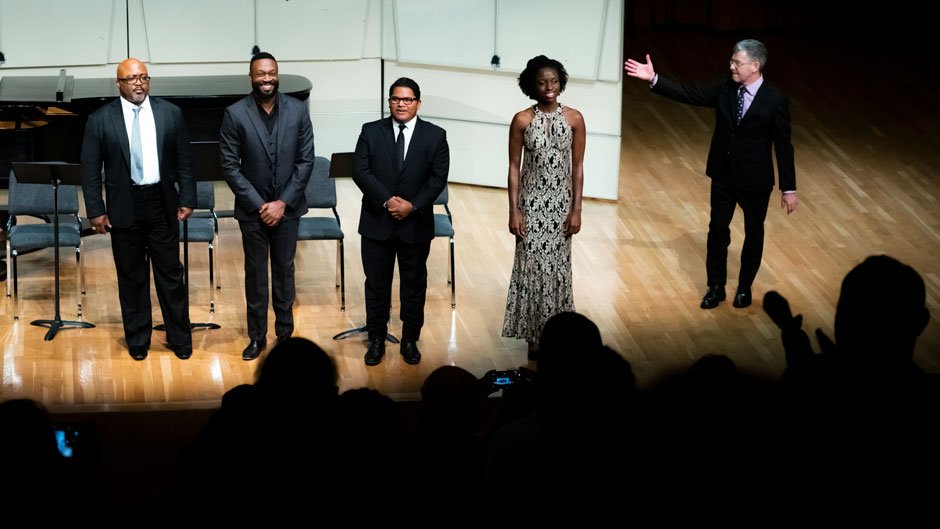Drawn from African-American history, music from four of Oscar-winning composer Anthony Davis’s operas—Amistad, The Central Park Five, Tania, and X—The Life and Times of Malcolm X—addressed issues of race and social significance last week in a stirring “Black Lives” concert at the Frost School.
“The collision of race and culture is endemic in my music,” Davis, a film, opera, orchestra, and chamber music composer said before the concert featuring four opera singers in recital format. They were accompanied on piano by professor Alan Johnson, who received a 2018 Provost Research Award to curate “Black Lives” for new audiences.
“The stories in my operas are drawn from the tragic consequences of the slave trade to the emergence of Black Nationalism, and wrongly accused victims of the American justice system,” Davis said.
“When writing operas, my goal is to make it truly American, to have it rooted in American music, particularly jazz,” he shared. “Growing up in the ’60s, I was very inspired by the passion of jazz bassist Charles Mingus, whose outspoken songs about civil-rights issues made a deep impression.” Duke Ellington’s major works “Harlem Suite” and “Black and Tan Fantasy” also impacted him, as did compositions by Billy Strayhorn. His music today is delightfully eclectic, fusing melodic, harmonic and rhythmic elements from classical, jazz, and hip-hop genres.
It was Johnson’s desire to speak out strongly for equality that inspired him to curate this unique concert with the composer present. “I was compelled by the Black Lives Matter movement, and wanted to present Anthony’s operatic work in a provocative new way to build new audiences, and introduce his new works to my students,” said Johnson, a professor of vocal performance and music director of the Frost Opera Theater. “I’m very excited that ‘Black Lives’ will be programmed at several other universities this year and beyond.”
The performers for “Black Lives” included artist-in-residence and former Frost faculty member Kevin Short; recent Frost School grad Andrés Lasaga, a tenor who earned a master’s degree in vocal performance; doctoral candidate Christine Jobson, a soprano who will join the New York MET production of Porgy and Bess after graduation; and alumnus Carl DuPont, a bass-baritone who earned a doctor of musical arts from the Frost School and will join the full-time faculty of Peabody Conservatory this fall.
DuPont, whose scholarly interest focuses on the contributions of black musicians, composers, and educators in higher music education, was filled with gratitude for the chance to perform in this production.
“The phrase ‘Black Lives Matter’ seems to be revolutionary to some—controversial, somehow—but it is obvious. In this concert we are exploring historical scenarios where black lives made a difference in history, even if they were excluded from the narrative,” he said. “American music has been tremendously influenced by blacks, from spirituals, to jazz, R&B to hip-hop. Blacks have impacted the world music scene tremendously. Black lives are vital and integral to our society.”
“I like the way opera can revisit history, reimagine history, and make history be more relevant today,” said Davis, whose next opera Greenwood 1921 will be premiered by Tulsa Opera. “I also love collaborating; when you collaborate you are not alone. The singers, the characters, the librettist, they are all in the room with me when I compose.”
Short has collaborated with Davis for over 30 years. “I was in the original production of “X” at New York City Opera in 1986, it was my first professional job,” he recalled. “I met Malcolm’s widow, Betty Shabazz. It is so poignant to perform this music again.”
“Malcolm X is a tragic hero, in the African American tradition,” Davis told the audience. “He goes through a transformation that reflects the evolution of African American politics and identity. The opera features a musical revolution from the swing and jump blues of the 1940s to the modal improvisations of John Coltrane and Miles Davis of the 1960s.”
Short’s performance in the Malcolm role of “You want the truth, but you don’t want to know,” was a tour-de-force in this Black Lives concert.
“Kevin is one of the best in this business, to be on stage with him is an honor,” said DuPont who studied voice with Short during his time the Frost School. “He is a consummate singer, musician, and actor. So imbued with intention.”
In a talkback session after the concert, the artists were asked if approaching these roles as performers of color brought new meaning to their roles.
“At first it is the same as any other music you are working on: the text, the music, and the rhythms, said Jobson. “But then you begin to focus on the roles, and it gets profound. When I began working on Margru’s main aria from Amistad, I contemplated how intense it would be for me, because I felt the character [who was taken away from her baby by force]— could have been me in a different place and time—so it put me in touch with a very vulnerable place.”
Lasaga agreed. “Some operas are from books of fiction. Yes, there are moments of passion, but it’s pretend,” he said. “But to play a character like the preacher Elijah in ‘X’—to really understand what his aim was in such a turbulent time, is raw and intense. It is a huge responsibility to represent these real characters. You want your performance to help move things forward for future generations.”
“Black Lives” will repeat twice this spring at the University of North Carolina at Charlotte and the University of California at San Diego.

